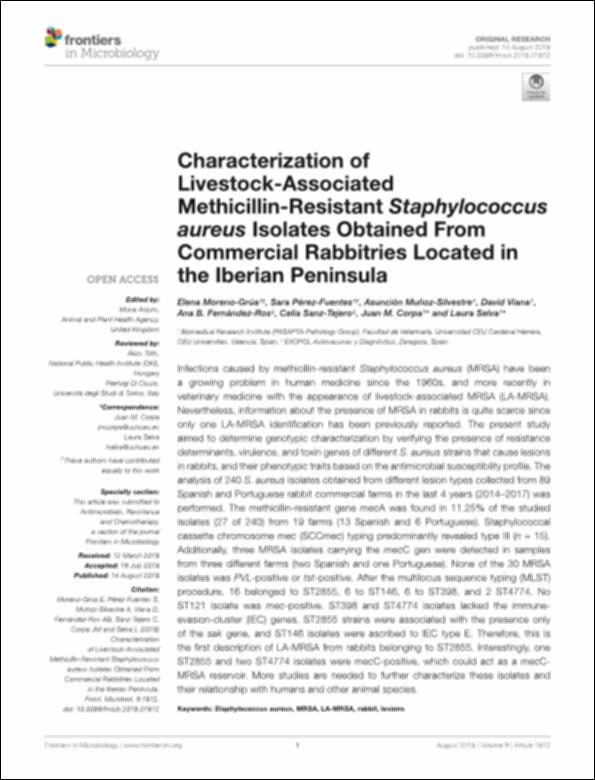Please use this identifier to cite or link to this item:
http://hdl.handle.net/10637/9987Characterization of livestock-associated methicillin-resistant "Staphylococcus aureus" isolates obtained from commercial rabbitries located in the Iberian Peninsula
| Title: | Characterization of livestock-associated methicillin-resistant "Staphylococcus aureus" isolates obtained from commercial rabbitries located in the Iberian Peninsula |
| Authors : | Moreno Grúa, Elena Pérez Fuentes, Sara Muñoz Silvestre, Asunción Viana Martín, David Fernández Ros, Ana B. Sanz Tejero, Celia Corpa Arenas, Juan Manuel Selva Martínez, Laura |
| Keywords: | Conejos - Enfermedades.; Rabbits - Diseases.; Staphylococcus - Drug resistance.; Estafilococos - Resistencia a los medicamentos. |
| Publisher: | Frontiers. |
| Citation: | Moreno-Grúa, E., Pérez-Fuentes, S., Muñoz-Silvestre, A., Viana, D., Fernández-Ros, AB., Sanz-Tejero, C., Corpa, JM. and Selva, L. . (2018). Characterization of livestock-associated methicillin-resistant Staphylococcus aureus isolates obtained from commercial rabbitries located in the Iberian Peninsula. Frontiers in Microbiology, vol. 9, art. 1812. DOI: https://doi.org/10.3389/fmicb.2018.01812 |
| Abstract: | Infections caused by methicillin-resistant Staphylococcus aureus (MRSA) have been a growing problem in human medicine since the 1960s, and more recently in veterinary medicine with the appearance of livestock-associated MRSA (LA-MRSA). Nevertheless, information about the presence of MRSA in rabbits is quite scarce since only one LA-MRSA identification has been previously reported. The present study aimed to determine genotypic characterization by verifying the presence of resistance determinants, virulence, and toxin genes of different S. aureus strains that cause lesions in rabbits, and their phenotypic traits based on the antimicrobial susceptibility profile. The analysis of 240 S. aureus isolates obtained from different lesion types collected from 89 Spanish and Portuguese rabbit commercial farms in the last 4 years (2014–2017) was performed. The methicillin-resistant gene mecA was found in 11.25% of the studied isolates (27 of 240) from 19 farms (13 Spanish and 6 Portuguese). Staphylococcal cassette chromosome mec (SCCmec) typing predominantly revealed type III (n = 15). Additionally, three MRSA isolates carrying the mecC gen were detected in samples from three different farms (two Spanish and one Portuguese). None of the 30 MRSA isolates was PVL-positive or tst-positive. After the multilocus sequence typing (MLST) procedure, 16 belonged to ST2855, 6 to ST146, 6 to ST398, and 2 ST4774. No ST121 isolate was mec-positive. ST398 and ST4774 isolates lacked the immuneevasion-cluster (IEC) genes. ST2855 strains were associated with the presence only of the sak gene, and ST146 isolates were ascribed to IEC type E. Therefore, this is the first description of LA-MRSA from rabbits belonging to ST2855. Interestingly, one ST2855 and two ST4774 isolates were mecC-positive, which could act as a mecCMRSA reservoir. More studies are needed to further characterize these isolates and their relationship with humans and other animal species. |
| Description: | Este artículo se encuentra disponible en la página web de la revista en la siguiente URL: https://www.frontiersin.org/articles/10.3389/fmicb.2018.01812/full |
| URI: | http://hdl.handle.net/10637/9987 |
| Rights : | http://creativecommons.org/licenses/by/4.0/deed.es |
| ISSN: | 1664-302X. |
| Issue Date: | 14-Aug-2018 |
| Center : | Universidad Cardenal Herrera-CEU |
| Appears in Collections: | Dpto. Producción y Sanidad Animal, Salud Pública Veterinaria y Ciencia y Tecnología de los Alimentos |
Items in DSpace are protected by copyright, with all rights reserved, unless otherwise indicated.


